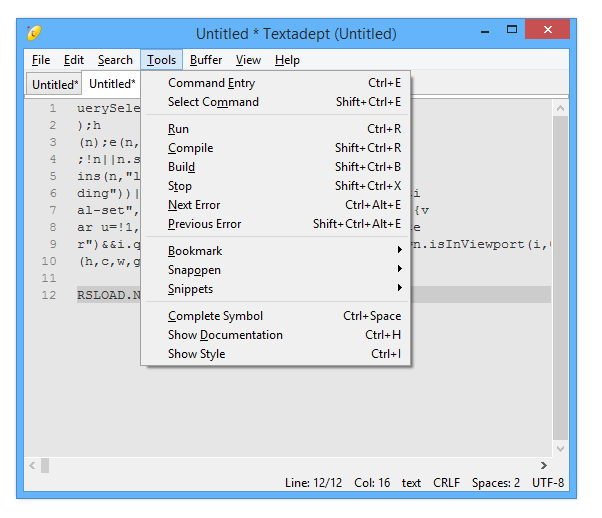
#Textadept sam license
It’s going to take a different way of thinking about the problem.įollowing the conversations on Twitter and Reddit, I got the sense that for some people the important aspects of Atom revolve around its license and its performance. The truth is that I think we can do orders of magnitude better, and I have some evidence of that already, but it’s going to take more than a new tool. And so we have to live with those limitations (which exist in even fantastic languages like Clojure). By virtue of the way we program now, really important notions like “flow” are lost and hidden under layers upon layers of indirection.
#Textadept sam code
It turns out that the way we organize code files ends up being very important, and there’s no way to glean a lot of the information that is stored in that organization purely through code walking. For example, showing functions individually actually introduces another level of cognitive load through the loss of locality. They seem to reach beyond making a kick-ass modern editor and ask for a more fundamental change, as Chris Granger hinted shortly after Atom’s announcement:įrom the outset, our goal has been to make programming better, and I’ve honestly come to the conclusion that LT on its own can’t do that. The last three, and especially the last two, are more timeless goals than the rest.

Light Table is based on exploring a future of building software.Ītom has some lofty goals too. He was inspired by Bret Victor’s talk Inventing on Principle, and cites some big historic landmarks on this path as the spark for Light Table: Smalltalk, Symbolics Genera, Logo, and HyperCard. What makes someone say, “Let’s just start from scratch”?įor Chris Granger, it was aspirations to change the way programming happens.

What really interests me about new editors are the forces that bring these new projects to the surface. There’s no shortage of editors or opinions on them. So if these two recent programming environment projects are points on a line, where does that line point? But I’m so comfy using ! Both envision open-source communities of 3rd party plugins ( Atom, Light Table).Both leverage modern languages to implement the editor itself ( Atom, LightTable).Both offer a web-based programming platform targeting customizability ( Atom, LightTable).Here’s some of what Light Table shares with Github’s Atom: In 2012, Chris Granger announced a project called Light Table, which I think was a recent mile marker on the same road as Atom. (Nice logo! *wink*) If you haven’t seen it, here’s a great hands-on post showing off its features. Github recently announced their project to create their own programming editor called Atom.


 0 kommentar(er)
0 kommentar(er)
